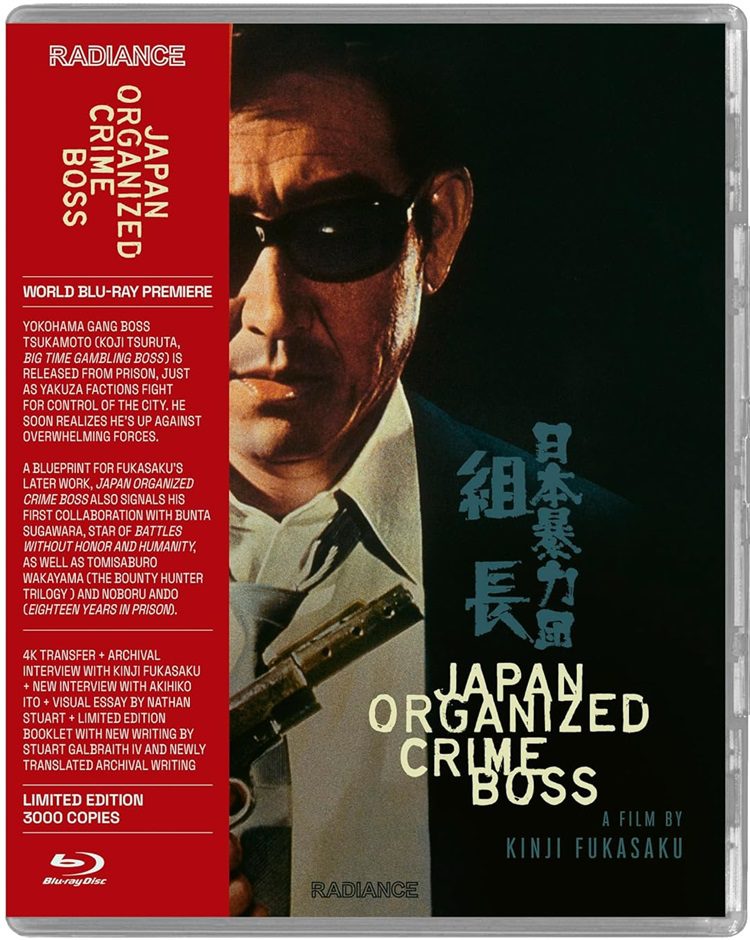
There are eight million stories in Japan and this is one of them. Kinji Fukasaku’s 1969 film Japan Organized Crime Boss doesn’t use that narration from The Naked City to open his film, but it could have. It has that same documentary style of filmmaking and opens with some narration giving us the rundown on Yakuza activity in post-World War II Japan.
Buy Japan Organized Crime Boss Blu-rayThe Danno Yakuza Organization has rapidly been expanding from its base in Osaka. They often push smaller gangs to join them and then use them to fight their battles against those who refuse to join, allowing the core members of the Danno Organization to remain relatively unscathed. Multiple yakuza families from Tokyo joined together to form the Toko Alliance, designed to stop the Danno Organization from making inroads into the capital city.
Tetsuo Tsukamoto (Kōji Tsuruta), the second in command of the Hamanaka Family, has just been released from prison, having served an eight-year sentence. He is an old-school yakuza. He lives by a code. He has honor. Like Michael Corleone in The Godfather movies, he would really like to leave the gangster life, but they keep pulling him back in. While he was gone, the boss made a deal with the Danno Organization, but now regrets it. When someone from the Sakurada Organization throws some dynamite into the boss’ car, he makes Tetsuo the new boss with his dying breath and begs him to break ties with the Danno Organization.
Tetsuo does exactly that and also works out a truce with the Sarkurada Organization. But knowing his men want revenge for their boss’ death, Tetsuo plans to kill the Sakurada boss, which will send him back to prison. Knowing this, one of his men kills the boss first and is himself killed in the process.
Honor. Loyalty. Codes. That’s what Tetsuo lives by and so do his men. But not everyone else. The plot gets quite complicated. Honestly, I had to read the Wikipedia entry a couple of times before I understood everything that happened. But those three words are at the heart of the film. Tetsuo retains his honor even when it does him harm.
There is one scene in which one of his men has been captured by the Hokuryu Kai gang. Tetsuo walks straight into the clan and asks for his man back. They are led by Miyahara (Tomisaburō Wakayama), a man addicted to drugs, a man without honor. But Tetsuo treats him with respect, even when Miyahara punches him, and then cuts his face with a blade. Tetsuo’s refusal to fight back affects Miyahara greatly, as we’ll find out later in the film.
There are multiple gangs. Lots of wheeling and dealings. A love interest and betrayals. It is a lot of plot to sort through. But it is handled well. At the center is Kōji Tsuruta’s performance, and it is masterful. He keeps things held tightly against his chest, but his face and his eyes express so much. This is a man filled with conflict. He wants out of this life but feels a duty to his men. He maintains his honor while so many around him betray their principles.
Kinji Fukasaku keeps things grounded. It is shot like a documentary. There is some narration, especially at the beginning, but mostly he lets the action tell the story. There are numerous fight sequences, gang battles mostly, but he shoots them with some remove. The fights aren’t flashy, and the camera rarely gets down into the action. Several times, it is shot with still photographs as if we’re seeing crime-scene photos or news reports. This works brilliantly with what the film is saying.
Like The Godfather, this film is building a myth around organized crime. Unlike Coppola’s masterpiece, this film allows us to look outside our main characters and see the dark underbelly of the Yakuza. For all its talk of honor and codes, most of these men are only out for themselves. Tesuo is the lone man who stands up for something bigger than that.
The film was a success and a slew of similar films that are often lumped together into a subgenre called Japan’s Violent Gang series. I haven’t seen any of them, but I’m gonna take a guess and say they up the violence and action sequences, but aren’t nearly as thoughtful as Japan Organized Crime Boss. Or as good. This film is a keeper.
Japan Organized Crime Boss is presented by Radiance Films with a new, excellent-looking 4K restoration from the Toei Company. Extras include:
- Uncompressed mono PCM audio
- Archival interview with Kinji Fukasaku
- Interview with yakuza film historian Akihiko Ito (2024)
- Visual essay on Koji Tsuruta’s collaborations with Fukasaku by yakuza cinema expert Nathan Stuart (2024)
- Trailer
- Newly improved English subtitle translation
- Reversible sleeve featuring original and newly commissioned artwork by Time Tomorrow
- Limited edition booklet featuring new writing by Stuart Galbraith IV and an archival review of the film
- Limited edition of 3000 copies, presented in full-height Scanavo packaging with removable OBI strip leaving packaging free of certificates and markings